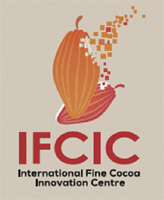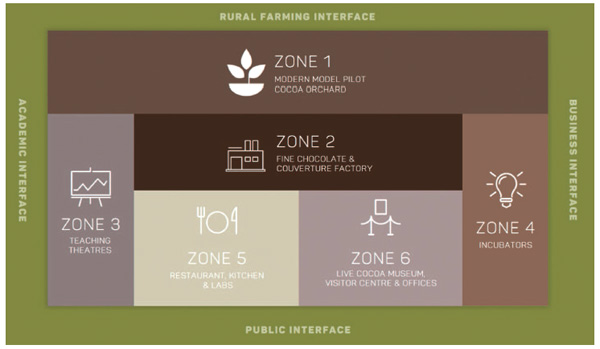
 The Caribbean cocoa sector is internationally known for the production of fine/flavour cocoa, and Trinidad and Tobago in particular, has a global reputation for its quality. This offers us a comparative advantage to leverage this sector in diversifying the economies of the region. The fine/flavour sector accounts for 5-6% of world cocoa production at present, but it is rapidly growing and morphing into a segmented niche and ultra-niche boutique sector, dominant in the metropolises of the world. The Caribbean cocoa sector is internationally known for the production of fine/flavour cocoa, and Trinidad and Tobago in particular, has a global reputation for its quality. This offers us a comparative advantage to leverage this sector in diversifying the economies of the region. The fine/flavour sector accounts for 5-6% of world cocoa production at present, but it is rapidly growing and morphing into a segmented niche and ultra-niche boutique sector, dominant in the metropolises of the world.
The boutiques operating in the sector are small, highly innovative, dynamic and attuned to the needs and wants of their customers. Whilst this artisanal chocolate market segment offers much higher prices (often 4-6 x premium) for cocoa beans and is a lucrative opportunity for the small-holder cocoa farming sector in the Caribbean, this requires the sector to become equally innovative in farming, processing, quality management, branding, certification, traceability and developing marketing linkages.
In addition, it is believed that the Caribbean region receives 13 million tourists annually, but the value-added cocoa sector in the Caribbean region is not yet developed to capitalise on the opportunities afforded by this high-value market on our doorsteps.
Neither the small-holder cocoa farming sector nor the weak value-added sector is equipped to access these opportunities without support to become innovative and dynamic to meet the high standards and specific demands of the artisanal chocolate sector.
The International Fine Cocoa Innovation Centre (IFCIC) was established as a development/outreach arm of the Cocoa Research Centre of The UWI to support the modernisation of the cocoa farming sector, while supporting the emergence of valued-added cluster/business sector and an attractive cocoa-based tourism sector that can harness values along the entire cocoa value chain using the best science, technology and innovation.
Initial support for the IFCIC came from the EU/ACP Science and Technology Fund. Under the PSIP, the Government of the Republic of Trinidad and Tobago has also allocated a sum of $6.2 million to support the infrastructure development to make this a reality.
The IFCIC is a developmental model established on the triple-helix approach, involving close collaboration between the University, and the private and public sector to bring alignment and focus to support development.
Firstly it provides a physical demonstrative model to showcase best practices; innovations and technologies along the cocoa value chain that persons can see, study and emulate; and it supplies innovative technologies and services to clients within the sector.
Secondly, it provides technology tool-kits and services to support the modernisation of the industry.
Thirdly, it offers apprenticeship training/internships and short-term training to disseminate the model.
Under and IDB-MIF [the Multilateral Investment Fund is a member of the IDB Group] project a number of new technologies developed as part of the IFCIC are being tested in 40 farms to developed more nuanced approaches to support the business development of individual farmers through more tailored support and necessary coaching to convert the farms into successful businesses.
The nerve centre of the IFCIC will be housed at the University Field Station at Valsayn and will consist of (a) a model 10-acre cocoa farm capable of producing in excess of 3000 kg of dry cocoa beans per ha, a far cry from the present production levels of 150 kg per ha; (b) a modern cocoa processing facility that will showcase innovations in fermentation, drying and storage of beans to convert the cocoa beans to elicit the unique flavour potential in a consistent manner; (c) a chocolate factory that will allow the cocoa beans of farmers to be processed into intermediary products, cocoa liquor, couverture, cocoa nibs, cocoa butter; (d) technology incubators that can help entrepreneurs develop a range of products including chocolates and confectionaries, (e) cocoa-based beverages and cuisines, cocoa nutraceutical products and cocoa cosmetics; (f) a business incubator to support entrepreneurship and marketing support and a cocoa museum and cocoa restaurant to support cocoa based agro-tourism at the Centre and elsewhere in T&T.
The IFCIC will work with the Cocoa Development Company of Trinidad and Tobago Ltd and the Ministry of Agriculture, Land and Fisheries to extend these technologies to the entire sector so that these innovations and novel technologies will have a snowballing effect on development. It will also work to develop policies and projects that will overcome constraints faced by farmers, processors and value-added outfits, including labour, access roads and markets.
It is our hope that the IFCIC will transform the present traditional cocoa sector into a modern farming sector with an energised business cluster around it so that it can extract the full value of the cocoa chain.
The Centre will also offer technology services, training and consultancies along the entire value chain for the local and regional cocoa sectors thus contributing to its sustainability as an institution. The IFCIC is organically linked to the Cocoa Research Centre of The UWI as the formal outreach arm of the CRC but features important investments and partnerships involving the private sector and the Government. The organic linkage to a knowledge centre such as The UWI is critical to allow the IFCIC to be continuously creative in problem-solving, adapting to the changing market environment and developing new technologies to improve efficiency to ensure that the sector remains in the forefront. The model approach taken with the IFCIC is also capable of creating knowledge-based and innovation-centric spinoffs that are competitive in the global space and valuable employment opportunities, fostering growth of the fine/flavour cocoa sector though attracting investment, developing successful, business models and disseminating them to acelerate development. We hope that the IFCIC will become a model for the development of other sectors in the Caribbean.

Here is what the IFCIC will feature
- A model 10-acre cocoa farm capable of producing in excess of 3000 kg of dry cocoa beans per ha.
- A modern cocoa processing facility that will showcase innovations in fermentation, drying and storage of beans to convert the cocoa beans to elicit the unique flavour potential in a consistent manner.
- A chocolate factory that will allow the cocoa beans of farmers to be processed into intermediary products, cocoa liquor, couverture, cocoa nibs, cocoa butter.
- Technology incubators that can help entrepreneurs develop a range of products including chocolates and confectionaries.
- Cocoa-based beverages and cuisines, cocoa nutraceutical products and cocoa cosmetics.
- A business incubator to support entrepreneurship and marketing support and a cocoa museum and cocoa restaurant to support cocoa based agro-tourism at the Centre and elsewhere in T&T.
Pathmanathan Umaharan is a professor of genetics and Director of the Cocoa Research Centre at The UWI St. Augustine Campus.
|





